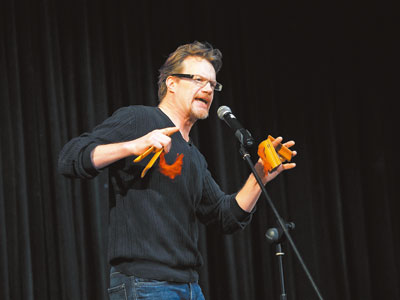
Cao Zhen
caozhen0806@126.com
EXPATS in China are often asked by their Chinese friends, “Are you used to eating Chinese food yet?” Mark Rowswell, a Canadian comedian who has been in China for 27 years, recently turned the question around and quipped at a young Chinese audience at his stand-up show in Beijing.
“Can you use chopsticks?” implies that he’s been eating Chinese food longer than many of them have been alive, leading to a round of laughs from the audience.
“What makes Chinese people laugh is what makes anybody laugh — the ridiculousness of the human experience,” Rowswell told the Shenzhen Daily in an exclusive interview. “The basic human sense of humor is universal, but you have to relate directly to people’s lives, to speak their language and refer to specific things people can relate to because humor is a shared experience.”
Rowswell will give two nights of Chinese stand-up shows at Nanshan Cultural and Sports Center on Friday and Saturday.
With the stage name Dashan, literally Big Mountain, Rowswell, 50, is the most famous Western TV entertainer in China, best known for his mastery of Mandarin and xiangsheng (crosstalk), a highly skilled traditional Chinese comedy performance style. He can also speak Cantonese and will tell a joke about his Cantonese learning experience at the Shenzhen shows.
Rowswell began studying Chinese at the University of Toronto in 1984 and continued his language studies at Peking University. Starting in 1988, his fame grew as he regularly performed comedy shows and acted as a host on Chinese TV. He received formal xiangsheng training from Chinese comedians in the 1990s. Since December 2013, Dashan has been performing Western-style stand-up comedy routines in Mandarin.
As a cultural ambassador between China and the West, Rowswell said his interest has always been in crossing the cultural divide. “That’s where I can make a unique contribution. I have no interest in doing English comedy. Relatively few people are able to cross the cultural and linguistic divide and speak directly to audiences on the other side. Joe Wong did that in the States; I do it in China. That’s what I enjoy the most,” said Rowswell.
Compared to xiangsheng, which requires two comedians to play off each other, stand-up requires just one performer telling jokes or humorous story-based experiences. But Rowswell believes stand-up is not easier than xiangsheng. “Stand-up allows me to create my own style. Xiangsheng is not a free-form style of comedy. It puts a lot of emphasis on tradition and ritual and performers have to uphold the traditions, which make it less creative than stand-up,” he said.
Speaking flawless Mandarin with a Beijing accent, Rowswell is not a crude and loud comedian who spews rancid humor and dirty jokes in China. He basically mocks himself, not Chinese people, sans Chinese social and political issues. Claiming himself a “foreigner,” he is very keen to “work within Chinese cultural norms.”
“Chinese have a very strong sense of self identity, and with a strong sense of ‘self’ comes an equally strong sense of ‘other.’ I don’t think Chinese find it funny to be mocked by Westerners. When you do mock things, you have to make sure you are standing on the same side as the audience. That’s difficult for a foreign national to do in China because you’re always considered a ‘guest.’ So you have to get past that perception that you are a guest and stand together with your audience as an equal,” he said.
Rowswell grew up listening to stand-up by Bill Cosby, Steve Martin, Richard Pryor and Eddie Murphy, but since he came to China in 1988 and spent 27 years immersed in Chinese entertainment, he said he missed a lot of Western entertainment through the 1990s and has been catching up on more modern comedians in the past few years.
Western-style stand-up comedy, either in Chinese or English, is springing up in bars and clubs in Chinese metropolises like Shenzhen, Beijing and Shanghai. Its audiences tend to be young, urban and well-educated, keen to hear something funny to de-stress.
Jesse Appell and Des Bishop are emerging Western comedians doing stand-up in Mandarin in Beijing. Both of them studied Chinese for just two years and tell jokes about being Westerners in China. They are examples of Chinese audiences’ openness to this new and creative foreign comedic style.
“In one sense, Western performers have a bit of an advantage because they naturally represent the fresh, cosmopolitan and international appeal of stand-up,” said Rowswell. “Des has been doing stand-up [in the West] for 19 years, which is at least 14 or 15 years longer than just about everybody else active in the stand-up scene in China, so he brings a wealth of professional experience that young Chinese performers don’t have,” Rowswell added.
For now, stand-up comedy in China is a tiny but growing circuit, so it’s rarely performed in theaters, not only because in larger venues it’s difficult to please everybody but also because comedians are required to submit jokes to be vetted by government censors.
Rowswell, however, doesn’t regard it as a simple situation of performers vs. the government. “Although political considerations are more sensitive in China, you’ll find that Chinese people aren’t all that interested in hearing foreigners mock the Chinese Government. A lot of stand-up comedy in the West is overtly political and sexual, but it doesn’t have to be. I think the media’s focus on stand-up comedy as somehow being primarily about political subversion is quite overblown. If you only focus on that aspect of stand-up comedy, you miss the big picture. Comedy is first and foremost about entertainment.”
|

